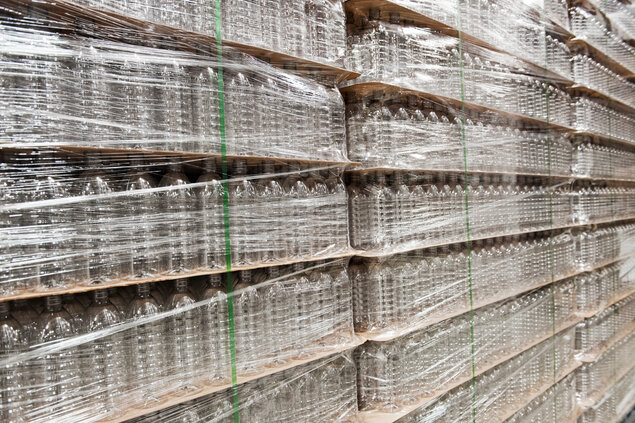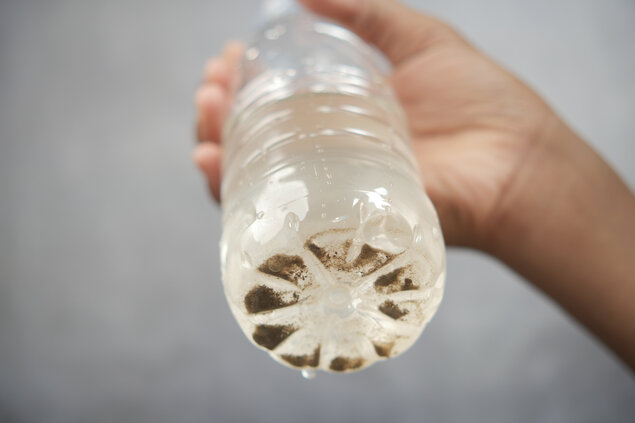The Environmental Impact of Bottled Water and Why Your Business Should Care
Many laughed off the “convenience” of bottling water to sell before the 1970’s. Then, the plastic water bottle emerged: convenience at your fingertips, at the long-term cost of the environment.
We get it—you’ve heard that plastic water bottles harm the environment. But did you know they can also harm your business and impact your service?
You can be part of the movement to protect the environment and your business’s bottom line by moving to an on-tap water dispensing system. See below what bottled water costs your business and what you can do to solve it.
The Hard Hit on the Environment
Bottled water's environmental impact is staggering, being 3500 times greater than that of tap water. We don’t need to go into every detail about the environmental impact of bottled water, but let’s do our due diligence to get an overarching understanding of how it hits our environment hard and leaves a carbon footprint. We’ll walk through some of those examples below.

Overflowing with Plastic Water Bottles
Each year, millions of tons of plastic bottle waste accumulate, significantly contributing to global pollution. Plastic water bottles can take hundreds of years to decompose, which makes it obvious how they could hit our waterways, landscapes, and oceans.
As these bottles break down, they release harmful chemicals into the soil and water, posing a threat to wildlife and marine life and, ultimately, to human health.
Recycling and Biodegradability of Bottled Water
The stark reality of plastic bottle recycling rates paints a concerning picture of the environment. Studies from the International Bottled Water Association (IBWA) reveal alarming statistics, indicating that only about 30% of plastic bottles are recycled.
Production of Plastic Water Bottles Is Leaving a Carbon Footprint
The environmental impact of bottled water extends far beyond just the plastic waste that accumulates in our landfills and oceans. The production process itself is resource-intensive, requiring vast amounts of water and fossil fuels, exacerbating carbon emissions and depleting natural resources.
In the United States alone, it takes 17 million barrels of oil annually to produce the plastic required to satisfy the demand for bottled water. A single 500 ml (16.9 oz) bottle of water generates 828 grams of carbon dioxide, contributing to its total carbon footprint.
3 Reasons TO STOP USING Plastic Water Bottles AT YOUR BUSINESS
All the above about the environmental impact of bottled water not only makes sense, but we’re sure you have heard quite a few times. However, did you know that bottled water is impacting your business? And the impact is financial.

1. It is Costing You in Manufacturing, Transportation, and Time
Water in plastic water bottles is often just tap water. That means you are really paying for the production of the plastic water bottle, the transportation of said water bottle, and the premium for branding.
When we break down how much it costs to produce and transport water bottles, it’s clear that tap systems are far more cost-effective for businesses in the long run.
The overall production cost for a standard 500 ml plastic water bottle ranges between $1 to $1.5. Out of that $1, the water itself accounts for less than $0.00001. The rest is pure markup.
Do you think manufacturers are willing to eat (or, in this case, drink) part of these costs? You know they aren’t. That means they are getting passed onto you—the client.
It Is Costing You in Inefficient Time Use
You may not have considered the cost of your time—the time it takes to inventory hundreds of water bottles, the time it takes to load and unload, and the time it takes to purchase packs of water.
You also pay for it with your employees. The time it takes for them to grab a bottle of water from the cooler, pour it, and serve it is the time you pay for it. This becomes even greater when using carbonated water to create cocktails and non-alcoholic mocktails.
In contrast, if you know cold, fresh water can come straight from the tap system you already use for beers, wines, and more—there is no running back and forth. There are fewer accidents, confusion, training, and money.

2. Health Concerns: Is Your Business Getting the Safest Water?
Clean water is still important to your business for both your employees and customers. Serving or using plastic water bottles may do the opposite by providing water in a potentially harmful container.
As plastics degrade, they fragment into tiny particles known as microplastics. These microplastics can further disintegrate into nanoplastics, invisible to the naked eye and capable of penetrating the body’s cells and tissues.
The toxicological research on microplastics is expanding swiftly, revealing that exposure to these particles can lead to various harmful effects. Studies indicate that microplastics can trigger oxidative stress, disrupt metabolism, provoke immune responses, cause neurotoxicity, and impair reproductive and developmental health.
Plastic water bottles may also contain bisphenol A (BPA). Research indicates that BPA can leach into food and drinks from containers made with the substance.
Further studies suggest associations between BPA exposure and an increased risk of high blood pressure, type 2 diabetes, effects on brain and prostate gland development in children, behavior changes in children and cardiovascular diseases.
As a business owner, putting your customers' and employees' health first prevents lawsuits, problems, and a bad reputation. You need to be aware of potential risks and take steps to reduce exposure to harmful substances.

3. A Sign of Respect for Your Environment and Local Community
When you respect others in the community, they respect you. Customers notice when you make changes to protect their environment and access clean, safe water.
More importantly, this perception can enhance what your business is known for and does in the community. It’s a double win: positive marketing and positive impact.
The National Restaurant Association’s 2022 State of the Restaurant Industry report supports the importance of this perception and relationship with the local community. In that year’s survey, 30% of adult consumers favored restaurants that offered food produced in an environmentally friendly way over restaurants that didn’t.
And the importance for local impact and community was favored among younger generations (48% of millennials and 40% of Gen Zs).
Larry Reinstein, president and CEO of LJR Hospitality Ventures, says, “People are interested in creating smaller carbon footprints. Customers relate to the fact it’s a local business and, quite honestly, that it’s better for the environment.”
Plastic water bottles impact your local community’s landfills and health. You can stand out and show you are committed to safer options for your customers and community because clients don’t want a business that supports their values and cares about their local community.

How Can You Reduce the Business and Environmental Impact of Bottled Water in Your Establishment
One critical step towards mitigating the business and environmental impact of plastic bottles lies in supporting initiatives that promote more convenient access to clean, safe water. You can do this within your own business.
Industry leaders are developing water dispensing solutions for filtering water while also providing cool, refreshing water at the drop of a tap.
Tap water systems are the emerging new water dispensing solution that addresses plastic bottled water's environmental and financial impacts on you as a business owner.
Not only do tap water dispensing systems reduce costs for you as a business owner (no need to produce, transport, and dispose of thousands of plastic water bottles), but they also provide the ideal option for clean, safe, and refreshingly cool water.
Micro Matic Water Dispenser: The Crisp, Clean, and Safe Answer
Micro Matic is proud to be part of this initiative with its top-of-the-line water dispensers on tap. Our water dispensing systems can ensure minerals aren’t removed while impurities are and keep your water always at the ideal temperature. Cleaning our water dispensing tap systems is easy, which means clean lines without dedicating too much time to cleaning. The ease of cleaning and reusing the water dispensing system means less cost associated with branding, transportation, and production.
Standing Out: The Carbonated Water and Sparkling Mocktail Movement
Our systems are unique in the balance and ease of delivering specific amounts of carbonation to water on tap. That means potential use for carbonated water on tap, other carbonated drinks that require specific carbonation levels, and the ability to create unique mocktails for the growing customer base looking for non-alcoholic options.
Cocktails and mocktails can become a huge upsell and potential customer draw for bars, restaurants, and establishments looking to expand their drink offerings with the tap system they already have in place.
Improve Your Operations, Reduce the Environmental Impact of Bottled Water, and Get Better Water on Tap
You understand the challenge of plastic bottle waste and its impact on operations and the environment. Embracing sustainable solutions, like installing Micro Matic water dispensers, not only addresses this issue but also enhances your commitment to eco-friendliness, cleanliness, and a better bottom line.
By choosing Micro Matic, you're part of a forward-thinking community aiming to reduce environmental threats. Let's work together to make a difference. Contact us to explore our water-on-tap solutions and take a step towards sustainability.
RELATED CONTENT
The Benefits of Serving a Variety of Drinks On Tap
What is Nitro Cold Brew Coffee: Why You Should Be Selling the Millennial’s Coffee
Is the Self-Serve Beer Tap System the Future for the Hospitality Industry?
10 Key Elements Of A Draft Beer System
Bryn + Dane's Healthy Fast Food
Your Pitcher Perfect Solution for Sourcing Quality Commercial Bar & Beverage Dispensers
EVERYTHING ON TAP
For over 60 years, Micro Matic has been recognized as one of the world’s leading suppliers of draft beverage equipment. Specializing in keg-to-glass technology, we offer a total solution for meeting beverage equipment needs. Our dedication to customer service is supported by four regional sales and distribution centers, the Micro Matic Dispense Institute for training and education, and a Certified Installer Network for installations. Want to speak with a “perfect pour” expert? Contact Micro Matic today.